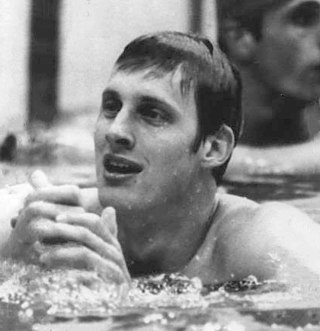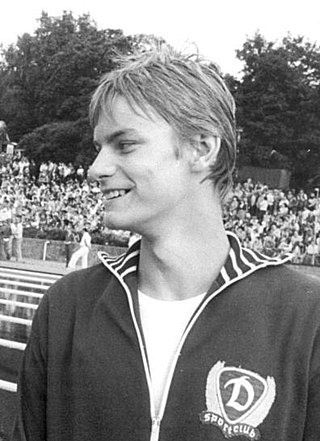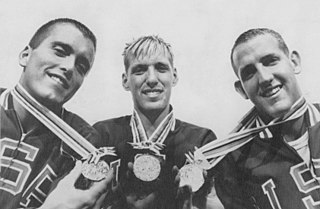
The men's 200 metre obstacle event was an obstacle swimming event in the 1900 Summer Olympics held in Paris. It was held on 11 August and 12 August 1900. Twelve swimmers from five nations competed. The event was won by Frederick Lane of Australia, with Otto Wahle of Austria second and Peter Kemp of Great Britain third. Lane had already won the 200 metre freestyle.

The men's 100 metre freestyle event at the 1976 Summer Olympics took place between July 24 and 25. This was the first time in history that the 100m freestyle was swum under 50 seconds. There were 41 competitors from 27 nations. Nations had been limited to three swimmers each since the 1924 Games. The event was won by Jim Montgomery of the United States, the nation's second consecutive and tenth overall victory in the men's 100 metre freestyle. His countryman Jack Babashoff took silver. Peter Nocke's bronze was the first medal for West Germany in the event, though the United Team of Germany had won a bronze in 1964.

Germany competed at the 1912 Summer Olympics in Stockholm, Sweden. 185 competitors, 180 men and 5 women, took part in 69 events in 14 sports. Due to the political fallout from World War I, this was the country's last appearance until 1928.

The men's 100 metre freestyle was a swimming event held as part of the swimming at the 1912 Summer Olympics programme. It was the fourth appearance of the event, which had not been featured at the 1900 Games. The competition was held from Saturday July 6, 1912, to Wednesday July 10, 1912. Thirty-four swimmers from twelve nations competed. The event was won by Duke Kahanamoku of the United States, the nation's second consecutive victory in the event. Cecil Healy took silver, the only medal in the event for Australasia, the short-lived joint team of Australia and New Zealand. Another American, Ken Huszagh, took bronze.
The men's 400 metre freestyle was a swimming event held as part of the swimming at the 1912 Summer Olympics programme. It was the third appearance of the event, which had been introduced in 1904. The competition was held from Thursday July 11, 1912 to Sunday July 14, 1912.
The men's 1500 metre freestyle was a swimming event held as part of the swimming at the 1912 Summer Olympics programme. It was the second appearance of the event, which had been introduced in 1908. At the 1904 and 1906 Olympics a one-mile freestyle contest was held. The competition was held from Saturday July 6, 1912 to Wednesday July 10, 1912.
The men's 100 metre backstroke was a swimming event held as part of the swimming at the 1912 Summer Olympics programme. It was the second appearance of the event, which had been introduced in 1908. In 1904 a 100-yard event was held. The competition was held from Tuesday July 9, 1912 to Saturday July 13, 1912.
The men's 4 × 200 metre freestyle relay was a swimming event held as part of the swimming at the 1912 Summer Olympics programme. It was the second appearance of the event, which had been introduced in 1908. The competition was held on Friday July 12, 1912 and Monday July 15, 1912.
The men's 400 metre breaststroke was a swimming event held as part of the swimming competition at the 1912 Summer Olympics. It was the second appearance of the event, which had been introduced in 1904. The competition was held from Monday July 8, 1912 to Friday July 12, 1912.

The women's 100 metre freestyle was a swimming event held as part of the swimming at the 1912 Summer Olympics programme. It was the first appearance of a women's event in Olympic swimming, followed closely by the 4×100 metre free relay. The competition was held from Monday to Friday, 8 to 12 July 1912.

The men's 100 metre freestyle event at the 1980 Summer Olympics was held on 26 and 27 July at the Swimming Pool at the Olimpiysky Sports Complex. There were 39 competitors from 26 nations. Nations had been limited to three swimmers each since the 1924 Games. The event was won by Jörg Woithe of East Germany, the nation's first medal in the men's 100 metre freestyle. Sweden earned its first medals in the event since 1952 with Per Holmertz's silver and Per Johansson's bronze.
The men's 200 metre breaststroke was a swimming event held as part of the swimming at the 1920 Summer Olympics programme. It was the third appearance of the event.
The men's 100 metre freestyle was a swimming event held as part of the swimming at the 1924 Summer Olympics programme. It was the sixth appearance of the event, which had not been featured at the 1900 Games. The competition was held on Saturday July 19, 1924 and on Sunday July 20, 1924. There were 30 competitors from 15 nations. Nations were limited to three swimmers each, down from four in 1920. The United States swept the medals for the second consecutive Games, winning its fourth consecutive gold medal. Johnny Weissmuller beat two-time defending champion Duke Kahanamoku in the final. Kahanamoku was the first man to win three medals in the event. His brother Samuel Kahanamoku earned the bronze medal.
The men's 200 metre breaststroke was a swimming event held as part of the swimming at the 1924 Summer Olympics programme. It was the fourth appearance of the event, which was established in 1908. The competition was held on Tuesday July 15, 1924, on Wednesday July 16, 1924, and on Thursday July 17, 1924.

The men's 100 metre freestyle event at the 1948 Olympic Games took place between 30 and 31 July at the Empire Pool. There were 41 competitors from 19 nations. Nations had been limited to three swimmers each since the 1924 Games. The event was won by Wally Ris, returning the United States to the podium in the event after a one-Games absence broke a seven-Games streak. It was the sixth victory for an American in the 100 metre freestyle, most of any nation. Another American, Alan Ford, took silver. Géza Kádas of Hungary earned bronze, the nation's third medal in four Games. Japan's three-Games medal streak in the event ended with no Japanese swimmers competing due to the nation not being invited after World War II.

The men's 100 metre freestyle event at the 1952 Summer Olympics took place between 26 and 27 July at the Helsinki Swimming Stadium. There were 61 competitors from 33 nations. Nations had been limited to three swimmers each since the 1924 Games. The event was won by Clarke Scholes of the United States, the nation's second consecutive and seventh overall victory in the men's 100 metre freestyle. Japan, absent from the 1948 Games after World War II, returned to the podium in the event with Hiroshi Suzuki's silver. Göran Larsson earned Sweden's first medal in the event since 1908 with his bronze.

The men's 100 metre freestyle event at the 1956 Olympic Games took place between 29 and 30 November. There were 34 competitors from 19 nations. Nations had been limited to three swimmers each since the 1924 Games. The event was won by Jon Henricks of Australia, the nation's first medal in the event. Australia would win a second 0.4 seconds later and a third 0.9 seconds after that, sweeping the podium—the first sweep in the men's 100 metre freestyle since the United States did it in 1920 and 1924, and the first sweep of any event by Australian competitors. This year, the Americans finished fourth through sixth. It was the first time since 1924 that Japan had competed but not medaled.

The men's 100 metre freestyle event at the 1964 Olympic Games took place between October 11 and 12. There were 66 competitors from 33 nations. Nations were again able to bring up to three swimmers each after a one-Games limit of two in 1960. The event was won by Don Schollander of the United States, the nation's first victory in the event since 1952 and eighth overall. Great Britain and the United Team of Germany both earned their first medal in the men's 100 metre freestyle.

The men's 200 metre backstroke event at the 1964 Summer Olympics took place between October 11 and 13. There were 34 competitors from 21 nations, with each nation having up to 3 swimmers. The medals were swept by the United States, with Jed Graef, Gary Dilley, and Bob Bennett taking gold, silver, and bronze respectively.

The men's 100 metre freestyle event at the 1972 Olympic Games took place between September 2 and 3. There were 48 competitors from 29 nations. Nations had been limited to three swimmers each since the 1924 Games. The event was won by Mark Spitz of the United States, his then-record sixth gold medal in a single Games. It was the ninth victory in the event for an American, most of any nation. Jerry Heidenreich, also of the United States, took silver. Soviet swimmer Vladimir Bure earned bronze, the nation's first medal in the men's 100 metre freestyle.












